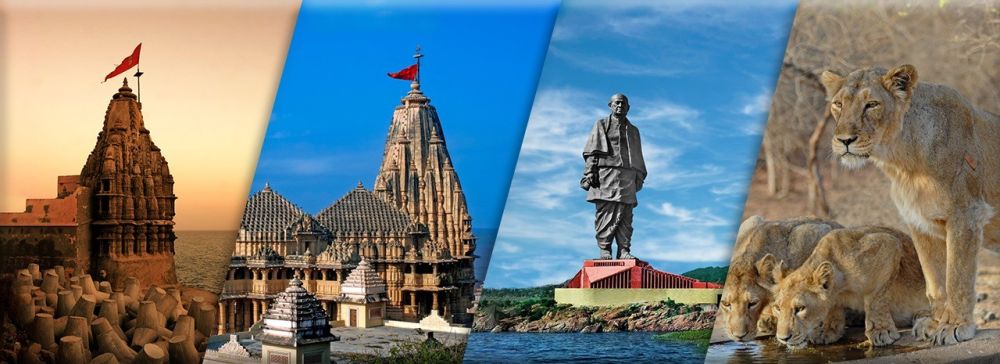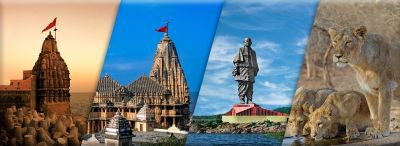

The Rann Utsav in Kutch is a vibrant cultural festival that showcases the rich tapestry of Gujarat's folk traditions, handicrafts, and arts. Held annually in the vast and picturesque salt marshes of the Rann of Kutch, this festival takes place during the cooler winter months, providing visitors with a unique opportunity to experience the desert's surreal beauty under the full moon. Tourists can stay in traditional Kutchi Bhungas (mud huts) or luxurious tents, enjoying local cuisine, camel safaris, live music, and dance performances that bring the desert to life. The festival also offers hot air balloon rides, giving those who partake a breathtaking view of the stark white landscape. The duration of a visit can vary, but attendees often stay for 2-3 days to immerse themselves in the local culture fully.
Home to the Asiatic lion, Gir National Park offers a safari experience unlike any other in India. This is your chance to see these majestic creatures in their natural habitat, along with a host of other wildlife, including leopards, hyenas, and various species of deer and antelope. The safaris are conducted in open-roof vehicles accompanied by experienced guides who provide insightful commentary on the park's flora and fauna. Each safari typically lasts around 3 hours, during which you can also visit the Gir Interpretation Zone, where captive animals are kept in chain-link enclosures. The best time to visit Gir is between December and March when the weather is pleasant, and the visibility of animals is high.
Located in Prabhas Patan near Veraval, Somnath Temple is one of the twelve Jyotirlinga shrines of Shiva. This ancient temple is a site of immense religious significance and a testament to the spiritual heritage of India. Reconstructed multiple times in history, the current structure boasts an intricate architecture that blends historical design with modern enhancements. Visitors come to marvel at the temple's grandeur, feel the spiritual ambiance, and enjoy the stunning views of the Arabian Sea. The temple also has an impressive light and sound show in the evening that tells the story of its rich past. A visit to Somnath can be a half-day activity combined with visits to nearby beaches and museums.
Sabarmati Ashram in Ahmedabad, once the residence of Mahatma Gandhi and his wife Kasturba, plays a crucial role in India's independence history. It's a tranquil and evocative place where visitors can learn about Gandhi's life and philosophies. The Ashram houses a museum called Gandhi Smarak Sangrahalaya which has five units - office, library, two photo galleries, and an auditorium. The life and teachings of Mahatma Gandhi are showcased through letters, photographs, and personal belongings. Visitors can explore the living quarters called 'Hriday Kunj', and the simple living conditions that Gandhi embraced. The duration of the visit is typically around 1-2 hours.
The Statue of Unity, situated near Kevadia in the Narmada district, is the world's tallest statue at 182 meters. It honors India's 'Iron Man', Sardar Vallabhbhai Patel, who played a key role in the country's struggle for independence. Visitors can go up to the observation deck located at the statue's chest level at 153 meters, offering panoramic views of the surrounding landscape and the Sardar Sarovar Dam. The complex includes a museum, a memorial garden, and a laser light and sound show. The statue and its surroundings are spread over a large area, so expect to spend at least half a day exploring the site. Additional attractions include a river rafting facility and the Sardar Patel Zoological Park nearby.
Located in the ancient city of Dwarka, the Dwarkadhish Temple is one of the foremost Chardham pilgrimage sites and one among the 108 Divya Desams of Lord Vishnu. Devotees visit this sacred shrine to witness its architectural beauty and to seek blessings from Lord Krishna, who is worshipped here. The temple stands majestically on the banks of the Gomti river and has a 5-storey tower supported by 72 pillars. Inside, the temple is adorned with intricate carvings, elaborate pillars, and sanctified idols. A visit to the temple can be completed in about 1-2 hours, but many pilgrims choose to participate in ceremonies and explore nearby holy sites, making their stay in Dwarka longer.
The Akshardham temple in Gandhinagar is not only a religious site but also a cultural campus that showcases the essence of India's ancient architecture, traditions, and spirituality. The temple is dedicated to Lord Swaminarayan and is known for its architectural grandeur, boasting beautifully carved pillars, domes, and idols. One of the highlights is the Sat-Chit-Anand Watershow, a multimedia water show which combines lasers, lights, water jets, and sound to tell stories from the Kena Upanishad. A tour of the temple complex and its exhibitions can be a spiritually enriching experience, often taking about 3 hours; the water show, typically held in the evening, is about 45 minutes long.
Maximize your experience of Kutch's unique landscape by camping at the White Desert. The experience includes an overnight stay in tents under the stars on the salt pans. Camping in this stark and beautiful environment offers a rare chance to disconnect and immerse in nature's silence. Many local operators offer packages that include a cultural program of folk music and dance, a local Kutchi dinner, and a sunrise view of the desert. Typically, the camping experience lasts for one night and a day, which includes experiencing the sunset and sunrise over the white desert sands. It's an ideal activity for those looking to experience something unique and serene.
Ahmedabad, or Amdavad as it's locally known, is home to India's first UNESCO World Heritage City title holder. A heritage walk through the old city is the best way to witness the charm of its historical architecture and understand local culture. The walk typically starts at the Swaminarayan temple in the Kalupur area and covers numerous sites such as the Jama Masjid, the pols (narrow lanes with community living), and centuries-old houses known for their wooden carvings and frescoes. Along the way, you might get to taste local snacks and interact with residents. This journey through narrow lanes and bustling bazaars usually lasts for 2 to 2.5 hours.
Navratri, meaning 'nine nights', is one of the most celebrated festivals in Gujarat, revering the goddess Amba in her nine forms. The entire state lights up and people of all ages are seen wearing colorful traditional attire as they participate in the Garba and Dandiya-Raas dances. The festival is celebrated at numerous venues across the state, including public squares, clubs, and streets. The dances go on late into the night, and various artists perform live. Many venues also offer lessons for beginners an hour or two before the main event starts. Celebrating Navratri in Gujarat can be a night-long affair for nine consecutive days during the festival period.
